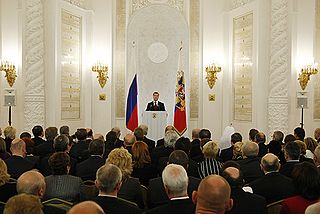
The annual Presidential Address to the Federal Assembly is a speech given by the Russian President to outline the state and condition in which Russia is in. It is given in front of a joint meeting of the two houses of the Russian Parliament: the State Duma and Federation Council. Article 84 of the current Constitution of Russia enacted in 1993 says "The President of the Russian Federation shall: address the Federal Assembly with annual messages on the situation in the country, on the guidelines of the internal and foreign policy of the State". First Russian President Boris Yeltsin delivered the first Address to the Federal Assembly on 24 February 1994. The date of the presidential address is not fixed.

The State Prize of the Russian Federation, officially translated in Russia as Russian Federation National Award, is a state honorary prize established in 1992 following the breakup of the Soviet Union. In 2004 the rules for selection of laureates and the status of the award were significantly changed, making them closer to such awards as the Nobel Prize or the Soviet Lenin Prize.
Kremlin.ru is the official website of the President of the Russian Federation. It was launched in January 2000. Content of the website is licensed under a Creative Commons Attribution 4.0 International license.

Russian Television and Radio Broadcasting Network (RTRN) (Russian: Российская телевизионная и радиовещательная сеть) is a unitary enterprise created on August 13, 2001, by decree of the president of the Russian Federation. The company is included in the list of Russian strategic enterprises.

Alexander Germanovich Burutin is a Lieutenant General of the Russian Armed Forces. Used to be Adviser to the President of Russia in 2003-2007 and First Deputy Chief of the General Staff of the Armed Forces of the Russian Federation until late 2010.

The visa history of Russia deals with the requirements, in different historical epochs, that a foreign national had to meet in order to obtain a visa or entry permit, to enter and stay in the country.

Eleonora Valentinovna Mitrofanova is a Russian diplomat. She currently serves as the Ambassador of Russia to Bulgaria, having held the post since 15 January 2021. She is the first woman to hold the post of First Deputy Minister of Foreign Affairs.

Nadezhda Georgievna Babkina is а Soviet and Russian folk and pop singer. In 1992 she was named a People's Artist of the RSFSR. A minor planet, 10684 Babkina, was named in her honor. Since 2014 she has been a deputy of the Moscow City Duma.
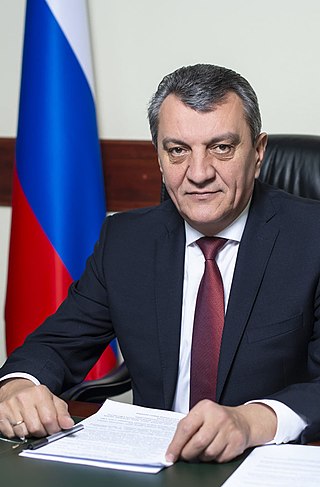
Sergey Ivanovich Menyaylo is a Russian military figure and statesman. He has been Head of the Republic of North Ossetia since 9 April 2021.
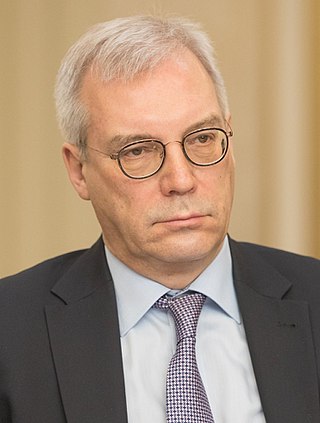
Alexander Viktorovich Grushko is a Russian diplomat, and is currently Deputy Minister of Foreign Affairs, since 22 January 2018. Previously, he was the Permanent Representative of Russia to NATO, serving from 2012 to 2018.

Stanislav Sergeyevich Voskresensky, is a Russian politician who is currently the 6th Governor of Ivanovo Oblast from 10 October 2018.
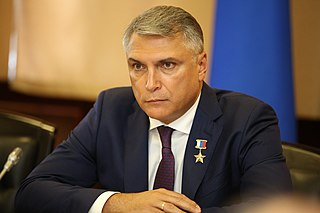
Aleksandr Anatolyevich Matovnikov, is a Russian statesman and military leader, who is a Lieutenant General as of 2018, and currently the Deputy Commander-in-Chief of the Ground Forces of the Russian Federation since 22 January 2020. He was awarded the title Hero of the Russian Federation in 2017.

The State Duma of the Federal Assembly of the Russian Federation of the 8th convocation is the current convocation of the lower house of Russian parliament.

Igor Mikhaylovich Rudenya, is a Russian statesman who is currently the 5th governor of Tver Oblast since 23 September 2016. He has the federal state civilian service rank of 1st class Active State Councillor of the Russian Federation.

Igor Ivanovich Kobzev, is a Russian statesman and former army officer, who is the incumbent 8th Governor of Irkutsk Oblast since 18 September 2020. He had previously been the acting governor, since 12 December 2019.
Andrey Aleksandrovich Podavalov, is a Russian politician who had been the acting Plenipotentiary Representative in the State Duma in 2009.
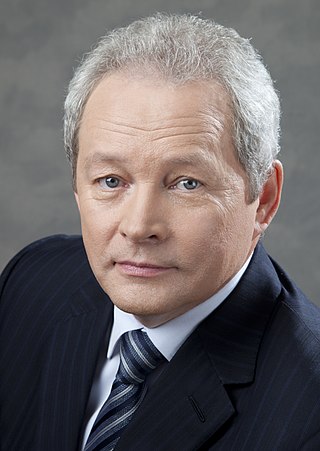
Viktor Fyodorovich Basargin, is a Russian statesman, who is currently the head of the Federal Service for Supervision in the Sphere of Transport (Rostransnadzor) - Chief State Transport Inspector of the Russian Federation since 10 February 2017. He has the federal state civilian service rank of 1st class Active State Councillor of the Russian Federation.

Sergey Konstantinovich Sitnikov, is a Russian politician and statesman. He has been the 4th Governor of Kostroma Oblast since 28 April 2012.

The Main Military-Political Directorate of the Armed Forces of the Russian Federation is the central military-political organization of the Russian Armed Forces, responsible for instilling ideological loyalty to the ruling government within the military. A revival of the Soviet Main Political Directorate, it is informally referred to as GlavPuR (ГлавПУР), the Russian abbreviation for the latter.

Martial law in Russia was introduced on 20 October 2022 during the ongoing Russian invasion of Ukraine and a month after the announcement of mobilization. President Vladimir Putin issued two decrees: "On the introduction of martial law in the territories of the DPR, LPR, Zaporozhye and Kherson Oblasts" and "On measures taken in the constituent entities of the Russian Federation in connection with Decree of the President of the Russian Federation dated October 19, 2022 No. 756".

















